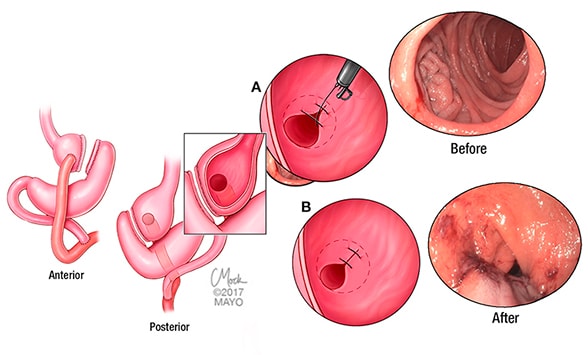June 13, 2018
Weight-loss (bariatric) surgery is currently the most effective way to lose weight and has the highest rates of weight maintenance in the long term. Results published in The New England Journal of Medicine in 2007 from the Swedish Obese Subjects study demonstrated that bariatric surgery can lead to sustainable weight loss and decreased overall mortality when compared with lifestyle intervention alone.
Although the Roux-en-Y gastric bypass (RYGB) is considered the gold standard for weight-loss surgeries, unfortunately, it is not without the possibility of weight regain. In a recent prospective, long-term study of patients who had undergone RYGB, 93 percent of patients maintained at least a 10 percent weight loss from base line, 70 percent maintained at least a 20 percent weight loss and only 40 percent maintained at least a 30 percent weight loss after 12 years.
Patients who regain weight after bariatric surgery feel that they have failed their last option, leading to a great deal of frustration, anger and even depression. There are a number of reversible causes of weight regain in this population. Options such as cognitive behavioral therapy, medications approved for weight loss and endoscopic interventions can be used to counter some of the factors that have resulted in weight regain, and offer patients real options to getting back on track with their weight-loss journey.
A dilated gastrojejunal anastomosis (GJA) is a major predictor of weight regain after RYGB. Surgical correction of this problem is technically challenging, requires a longer procedure and hospital stay than RYGB, and is associated with significant morbidity and limited efficacy.
According to Barham K. Abu Dayyeh, M.D., M.P.H., a gastroenterologist who specializes in bariatric and metabolic endoscopy at Mayo Clinic's campus in Minnesota: "One of the most common anatomical changes over time is the enlargement of gastrojejunal stoma size, contributing to weight regain by a reduction in satiety and allowing the patient to increase volume of food consumed in one meal. Dilated gastrojejunal stoma can be treated surgically; however, this revision requires a technically difficult dissection and has a significant risk of morbidity and complications.
Transoral outlet reduction procedure

Transoral outlet reduction procedure
Anatomic relationships of Roux-en-Y gastric bypass is shown on the left. A and B. The transoral outlet reduction (TORe) endoscopy procedure. An endoscopic suturing system is used to plicate the gastrojejunal anastomosis (Before) and reduce its size to 1 cm (After), thus restoring the restrictive component of the gastric bypass. Image reprinted with permission from Endocrinology Update. Mayo Clinic. 2018;13(2):2.
"Recently, with advancements in endoscopic suturing devices, a novel approach to reduction of the stoma diameter has emerged: transoral outlet reduction (TORe) endoscopy. This procedure can be performed on an outpatient basis with a favorable risk profile compared with revisional bariatric surgery. An endoscopic suturing system is used to plicate the gastrojejunal anastomosis and reduce its size to 1 cm, thus restoring the restrictive component of the gastric bypass."
A number of studies have shown efficacy of TORe in patients who are regaining weight. In a study published in Surgical Endoscopy in 2018, Dr. Abu Dayyeh and colleagues at Mayo Clinic's campus in Minnesota examined the safety and long-term efficacy data associated with TORe in patients who had previously undergone RYGB. Mayo researchers conducted a meta-analysis of data from existing literature and a systematic review of patient records from three participating bariatric surgery centers that included patients who underwent TORe from January 2013 to November 2016. The literature review included data from 330 patients, and the multicenter analysis included data from 130 patients.
"In 130 consecutive patients across three centers undergoing TORe with an endolumenal suturing device, the average weight lost at six, 12 and 18 months after TORe was 9.31 ± 6.7 kg (n = 84), 7.75 ± 8.4 kg (n = 70) and 8 ± 8.8 kg (n = 46), respectively," says Dr. Abu Dayyeh.
Weight regain after bariatric surgery can be devastating to patients, as they often feel like failures and are at a loss for where to go next. A multidisciplinary approach that includes TORe, cognitive behavioral therapy programs and weight-loss medications can provide patients with an array of effective options. For questions or patient referrals related to the TORe procedure, please send an email to weightmanagement@mayo.edu.
For more information
Sjöström L, et al. Effects of bariatric surgery on mortality in Swedish obese subjects. The New England Journal of Medicine. 2007;357:741.
Vargas EJ, et al. Transoral outlet reduction with full thickness endoscopic suturing for weight regain after gastric bypass: A large multicenter international experience and meta-analysis. Surgical Endoscopy. 2018;32:252.
Weight regain after bariatric surgery. Endocrinology Update. Mayo Clinic. 2018. ;13(2):2.